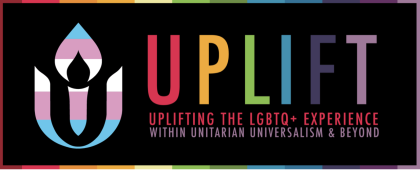 UUA adopted new values replacing their 7 principles. CVUUS prepared for this by adopting our own version of a proposed anti-racism amendment to the UUA By-Laws that has been named the 8th Principle in March 2023.
UUA adopted new values replacing their 7 principles. CVUUS prepared for this by adopting our own version of a proposed anti-racism amendment to the UUA By-Laws that has been named the 8th Principle in March 2023.
1) We changed the name from “8th Principle” to a social justice covenant “Calling to Dismantle Racism and Other Oppressions” to avoid confusion with the UUA By-Laws governing all congregations.
2) We proposed text, approved unanimously by our CVUUS Board, for comments, questions and vote after worship on March 5 and approved this covenant: “We commit to journey toward spiritual wholeness by working to build a diverse multicultural Beloved Community through our actions that accountably dismantle racism and other oppressions in ourselves and our institutions.”
Our Black neighbors, friends, and family members have been asking us to dismantle racism in ourselves for a long time. “No More Killing” vigils sponsored by CVUUS and Showing Up for Racial Justice (SURJ) congregating at Middlebury’s College Park pre-COVID said NO to police brutality following George Floyd’s death. Follow more below and here.
CVUUS Race in America Book Group
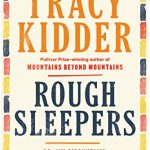 Rough Sleepers: Dr. Jim O’Connell’s Urgent Mission to Bring Healing to Homeless People by Tracy Kidder book group convenes in Feb! Rough Sleepers tells the powerful story of an inspiring doctor who made a difference, by helping to create a program to care for Boston’s homeless community—by the Pulitzer Prize–winning, New York Times bestselling author of Mountains Beyond Mountains. The book group (open to CVUUS and the public) ran Wed. Feb 7, Feb 28 and March 13 at 7 pm in Fellowship Hall. ZOOM option was available here. Facilitated by Ellen Flight, Tom Morgan and Mike Greenwood.
Rough Sleepers: Dr. Jim O’Connell’s Urgent Mission to Bring Healing to Homeless People by Tracy Kidder book group convenes in Feb! Rough Sleepers tells the powerful story of an inspiring doctor who made a difference, by helping to create a program to care for Boston’s homeless community—by the Pulitzer Prize–winning, New York Times bestselling author of Mountains Beyond Mountains. The book group (open to CVUUS and the public) ran Wed. Feb 7, Feb 28 and March 13 at 7 pm in Fellowship Hall. ZOOM option was available here. Facilitated by Ellen Flight, Tom Morgan and Mike Greenwood.
Jean Terwilliger and Mike Greenwood led a common reading and discussion of Asian American Histories of the United States by Catherine Ceniza Choy, published by Beacon Press in Spring 2023 on Zoom here.
 Original and expansive, Asian American Histories of the United States is a nearly 200-year history of Asian migration, labor, and community formation in the US. Reckoning with the onset of the COVID-19 pandemic and the surge in anti-Asian hate and violence, award-winning historian Catherine Ceniza Choy presents an urgent social history of the fastest growing group of Americans. The book features the lived experiences and diverse voices of immigrants, refugees, US-born Asian Americans, multiracial Americans, and workers from industries spanning agriculture to healthcare. Despite significant Asian American breakthroughs in politics, arts, and popular culture , a profound lack of understanding of Asian American history permeates American culture.
Original and expansive, Asian American Histories of the United States is a nearly 200-year history of Asian migration, labor, and community formation in the US. Reckoning with the onset of the COVID-19 pandemic and the surge in anti-Asian hate and violence, award-winning historian Catherine Ceniza Choy presents an urgent social history of the fastest growing group of Americans. The book features the lived experiences and diverse voices of immigrants, refugees, US-born Asian Americans, multiracial Americans, and workers from industries spanning agriculture to healthcare. Despite significant Asian American breakthroughs in politics, arts, and popular culture , a profound lack of understanding of Asian American history permeates American culture.
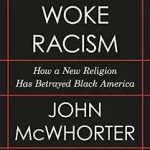 Jean and Mike led a common reading and discussion of Woke Racism by John McWhorter in Fall 2022. Acclaimed linguist and award-winning writer John McWhorter argues that an illiberal neo-racism, disguised as antiracism, is hurting Black communities and weakening the American social fabric. Americans of good will on both the left and the right are secretly asking themselves the same question: How has the conversation on race in America gone so crazy? We’re told to read books and listen to music by people of color but that wearing certain clothes is “appropriation”. We hear that being White automatically gives you privilege and that being Black makes you a victim. We want to speak up but fear we’ll be seen as unwoke, or worse, labeled a racist. According to McWhorter, the problem is that a well-meaning but pernicious form of antiracism has become, not a progressive ideology, but a religion – and one that’s illogical, unreachable, and unintentionally neo-racist. He shows how this religion that claims to “dismantle racist structures” is actually harming his fellow Black Americans by infantilizing Black people, setting Black students up for failure, and passing policies that disproportionately damage Black communities.
Jean and Mike led a common reading and discussion of Woke Racism by John McWhorter in Fall 2022. Acclaimed linguist and award-winning writer John McWhorter argues that an illiberal neo-racism, disguised as antiracism, is hurting Black communities and weakening the American social fabric. Americans of good will on both the left and the right are secretly asking themselves the same question: How has the conversation on race in America gone so crazy? We’re told to read books and listen to music by people of color but that wearing certain clothes is “appropriation”. We hear that being White automatically gives you privilege and that being Black makes you a victim. We want to speak up but fear we’ll be seen as unwoke, or worse, labeled a racist. According to McWhorter, the problem is that a well-meaning but pernicious form of antiracism has become, not a progressive ideology, but a religion – and one that’s illogical, unreachable, and unintentionally neo-racist. He shows how this religion that claims to “dismantle racist structures” is actually harming his fellow Black Americans by infantilizing Black people, setting Black students up for failure, and passing policies that disproportionately damage Black communities.
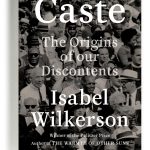 Jean and Mike led a common reading and discussion of Caste: The Origins of Our Discontent by Isabel Wilkerson in early 2022. This Pulitzer Prize–winning, bestselling author of The Warmth of Other Suns examines the unspoken caste system that has shaped a number of countries including the United States and shows how our lives today are still defined by a hierarchy of human divisions. They convened on the 4th Wednesday of the month from January through April 2022.
Jean and Mike led a common reading and discussion of Caste: The Origins of Our Discontent by Isabel Wilkerson in early 2022. This Pulitzer Prize–winning, bestselling author of The Warmth of Other Suns examines the unspoken caste system that has shaped a number of countries including the United States and shows how our lives today are still defined by a hierarchy of human divisions. They convened on the 4th Wednesday of the month from January through April 2022.
The first session began with introducing ourselves and our responses to the question, what do you hope to get from being in this book group? Generally, the book discussion format was consistent throughout their time together, but they easily adapted to changes anyone wanted to make. Jean and Mike invited dialogue with questions so you could share things that resonated or challenged you, or made you wonder or learned, or a question that arose. Participants of this group felt inspired to lead a series of discussions on how CVUUS can address the problems of a lack of affordable housing in Addison County starting in Dec 2022 and continuing on the first Monday of the month in 2023.
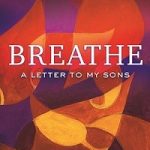 Jean and Mike led a common reading and discussion of Breathe: A Letter to My Sons by Imani Perry in early 2021. You can borrow a copy of it and many other books on race from the CVUUS Library (see below). CVUUS has conducted other common reads on race including White Fragility: Why It’s So Hard for White People to Talk About Racism by Robin DiAngelo and Just Mercy: A Story of Justice and Redemption by Byron Stevenson.
Jean and Mike led a common reading and discussion of Breathe: A Letter to My Sons by Imani Perry in early 2021. You can borrow a copy of it and many other books on race from the CVUUS Library (see below). CVUUS has conducted other common reads on race including White Fragility: Why It’s So Hard for White People to Talk About Racism by Robin DiAngelo and Just Mercy: A Story of Justice and Redemption by Byron Stevenson.
Proposed “8th” UU Principle: Dismantling Systemic Racism
“We, the member congregations of the Unitarian Universalist Association, covenant to affirm and promote: journeying toward spiritual wholeness by working to build a diverse multicultural Beloved Community by our actions that accountably dismantle racism and other oppressions in ourselves and our institutions.”
WHERE DID THIS COME FROM ORIGINALLY?
- Paula Cole Jones, JPD (Joseph Priestley District—the mid-Atlantic district of the UUA, now subsumed into the larger Central East Regional Group, CERG) Director of Racial & Social Justice, developed the idea of the existence of 2 different paradigms in UU circles: the UU 7 Principles and Beloved Community (deep multiculturalism). After working with congregations on these issues for over 15 years, she realized that a person can believe they are being a “good UU” and following the 7 Principles without thinking about or dealing with racism and other oppressions at the systemic level. Evidence: most UU congregations are primarily European-American in membership, culture (especially music), and leadership, even when located near diverse communities. She realized that an 8th Principle was needed to correct this, and talked with Bruce Pollack-Johnson about some of the components that should be in it. Bruce put together an initial draft in 2013, and the two of them worked with a group of anti-racist activists in the JPD to refine it. Bruce’s congregation (the UU Church of the Restoration in Philadelphia) incorporated it into their Covenant at that time, then in May 2017 formally adopted it for themselves and recommended that the UUA adopt it.
- UUs and the UUA have done very good work in fighting racism, such as during the Civil Rights Movement and in the 1990’s (passing a resolution in 1997 at GA, after a precursor resolution in 1992, to become an Anti-Racist, Anti-Oppression Multi-Cultural, or ARAOMC, Organization), but the funding and support started to wane in the 2000’s – our accountability mechanism failed us. UU’s also have a mixed record historically in other areas of racial justice: e.g., we had people on both sides of Abolitionism (including people like Jefferson who was a slaveholder), and Unitarians were proponents of Eugenics (leading to some of the racial extremes of Nazism and Apartheid in South Africa).
- For people identified as white, it is too easy to ignore these issues, which is exactly what keeps the system of racism in our society alive and in fact worsening right now. We need to de-center whiteness and other dominant cultures in UUism.
- The 8th Principle came from a feeling that we need something to renew our commitment to this work, to hold ourselves accountable, and to fulfill the potential of our existing principles.
- See more on the 8th Principle here
Thanks to those who came to the congregational conversation on this following worship on Sun. Nov 20, 2022 and to subsequent discussions following worship in Dec and Jan leading up to a vote in early March.
Renamed Proposed 8th Principle: CVUUS adopted our own version of a proposed anti-racism amendment to the UUA By-Laws that has been named the 8th Principle in March 2023.
1) Name changed from “8th Principle” to a covenant “Calling to Dismantle Racism and Other Oppressions” to avoid confusion with the UUA By-Laws governing all congregations
2) Proposed text, approved unanimously by our CVUUS Board, for comments, questions and vote after worship on March 5 and approved this: “We commit to journey toward spiritual wholeness by working to build a diverse multicultural Beloved Community through our actions that accountably dismantle racism and other oppressions in ourselves and our institutions.”
How Racism Impacts UU’s and Our Congregation Study Group
Rev. Barnaby led a 5-session class in Oct-Dec 2021 based on the UU Association’s Widening the Circle of Concern Report, an in-depth study issued in 2020 looking at how racism shows up within Unitarian Universalism. Look for more here.
From Rev. Barnaby (April 2021): Beloveds, I won’t say much about Derek Chauvin’s conviction for the murder of George Floyd. My job as your minister is to say something bearing witness on behalf of Champlain Valley UU’s on occasions like this. My job as a privileged white male in our society is to speak only after listening long and hard and reconsidering my – and our – connection to the systemic racism driving all of these events.
What I’m hearing that makes sense to me to share with you now are these few points:
- This is not a case of justice being done, this is a case of accountability being assigned to a leading player in one unjust killing; as Minnesota’s Attorney General Keith Ellison succinctly reminded us “Accountability it just the first step toward justice.”.
- Accountability here emerged from an unusual set of circumstances involving determined prosecutors, many brave, traumatized observers stepping forward as witnesses including providing video they recorded with extraordinary courage and presence of mind as the murder unfolded, activists working hard to organize in support of prosecution on all the charges brought, and a sizable number of influential law enforcement figures breaking the “blue wall of silence” that makes it so hard to control police violence. (“This didn’t happen because the system worked but because the people put in the work,” said Nekima Levy Armstrong, a member of the Minnesota Justice Coalition).
- Beware the “bad apple” argument. Chauvin may fit that definition (for now – as UU’s, we pray he changes course with the rest of his life and have faith that such an outcome is possible). But “bad apples” are not an alternative explanation for racist outcomes in policing to systemic problems in our society, including how we train police and what we expect of them. “Bad apples” exacerbate the problems but should never become a white supremacist excuse for not tackling the broader issues.
- Don’t overlook how often BIPoC commenters and the rest of us are describing our first reactions as “I can breathe.” Let’s keep working for things that help us – and every being with whom we share the planet – breathe more freely. (Don’t forget, sometimes it’s putting on a mask for a while that helps).
21 Day Challenge: https://www.eddiemoorejr.com/21daychallenge
 Showing Up for Racial Justice (SURJ)
Showing Up for Racial Justice (SURJ)
If you are a white person reading this, please make a commitment to diving deep into the work of dismantling white supremacy in yourself, our community, and our world. Our Black neighbors, our Indigenous neighbors, our neighbors of color have been asking this of us for a long, long time. We are here to support you on this path. Attend our movie screenings at Middlebury’s Marquis Theater. Watch the weekly blast for invites to upcoming ones.
Stay Healthy & Safe, CVUUS & SURJ
- Read How to Be Less Stupid About Race, by Crystal Fleming. There are So Many Other Amazing Books we could list here, but this one is particularly fabulous, and you can get it at VT Bookshop. Two others include Me and White Supremacy by Layla Saad and How to be an Anti Racist by Ibram X. Kendi.
- Join anti racism book groups. Working with a small group of other white folks committed to this path is a really important way to strengthen our anti racism muscles.
- Post a Black Lives Matter lawn sign. Contact Priscilla Bremser to get one for $15.
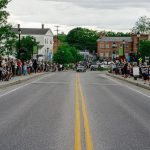 Working to dismantle internalized white supremacy is a lifelong endeavor. The work is never done. And in the same way that racist power structures have been constructed and reinforced over centuries, racism is not going to be dissolved this week or this year.
Working to dismantle internalized white supremacy is a lifelong endeavor. The work is never done. And in the same way that racist power structures have been constructed and reinforced over centuries, racism is not going to be dissolved this week or this year. Talking with Children
Lauren Wyeth, Director of Children, Youth and Family Ministries at First Universalist Church of Minneapolis
May 31, 2020 Message for All Ages
Lauren gives a really truthful yet tender telling of what happened to George Floyd and why people are so upset about it. And she also offers really meaningful ways for families to respond on a small scale in our homes, our neighborhoods, or with our local officials. Definitely worth a watch as a parent, to have some language modeled for a great way to talk with your own kids about what happened and why it’s important to take some kind of action as Unitarian Universalist.
Supporting Kids Of Color in The Wake of Racialized Violence: Part One(with a link to Part Two)
Still relevant, unfortunately, this very first EmbraceRace live conversation happened in July of 2016 in the immediate aftermath of the murders of Alton Sterling, Philando Castile and 5 Dallas police officers. We convened by phone and over 700 people joined the call. For this conversation, EmbraceRace co-founders Andrew Grant-Thomas and Melissa Giraud frame and moderate a discussion between child psychologist Dr. Allison Briscoe-Smith, educator Dr. Sandra Chapman, and a group of parents, teachers, and other caregivers concerned about black and brown children.
Raising White Kids (7 mins. listen)
NPR’s Michel Martin talks to Jennifer Harvey, author of Raising White Kids: Bringing Up Children in a Racially Unjust America, about how to talk with white kids about racially-charged events.
Talking with Children About Racism, Police Brutality, and Protests
Article that has concrete example of how to talk to kids of different ages about these topics.
Barbara Clearbridge wants to recommend a book to the CVUUS community which addresses how trauma, including racial trauma, is passed on from generation to generation. It focuses on three populations: white people (who have traumatized each other since the Middle Ages), black people, and the police, who are traumatized in their own way by observing traumatic incidents, by fear, and by their own actions.
 CVUUS Library
CVUUS Library
CVUUS Library offers reading lists here on race and other related topics. There is one list for adults and another for children. Visit the new library on the lower level of the Sanctuary or make arrangements through Artley Wolfson or the Office. We are happy to find a title for you and to receive your donations or recommendations for future titles.
My Grandmother’s Hands, subtitled Racialized Trauma and the Pathway to Mending Out Hearts and Bodies, by Resmaa Menakem, a black man from Cincinnati, takes a body-centered approach, saying that trauma is passed on through DNA and that we can heal our DNA. He puts forward a strong argument that we can’t end racial prejudice by only changing our minds because this prejudice, racial trauma, and hatred (of other and of self) is in our bodies and our culture. He gives practical suggestions for all three populations and for the interactions among us. Recommend it highly. By the way, in his acknowledgments, he thanks his brother, police officer Christopher Mason!
Resmaa was interviewed on Minnesota Public Radio about his new book to help us prepare for the race/identity (white supremacy) war that he says is already here and predicts will intensify between 2022 and 2025. By prepare, he means to embody the trauma that we carry and learn how to settle ourselves as we experience cultural trauma. Listen to it here.
JUNETEENTH
Juneteenth, official name of federal holiday Juneteenth National Independence Day, also called Emancipation Day, Freedom Day, Jubilee Day, Black Independence Day, and Juneteenth Independence Day, holiday commemorating the end of slavery in the United States, observed annually on June 19. Juneteenth is celebrated on Sunday, June 19, 2022. In 1863, during the American Civil War, Pres. Abraham Lincoln issued the Emancipation Proclamation, which declared more than three million slaves living in the Confederate states to be free. More than two years would pass, however, before the news reached African Americans living in Texas. It was not until Union soldiers arrived in Galveston, Texas, on June 19, 1865, that the state’s residents finally learned that slavery had been abolished. The former slaves immediately began to celebrate with prayer, feasting, song, and dance. More here.

